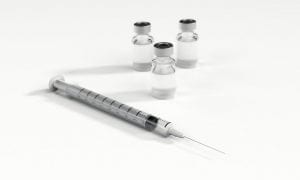Over the last few months, researchers have been enrolling and dosing patients with hereditary angioedema (HAE) from Europe, Israel, and Canada within the Phase 2 RAPIDe-1 clinical trial. According to Angioedema News, the clinical trial, which is evaluating the investigational oral treatment PHVS416, is now expanding to enroll patients within the United States.
Hereditary Angioedema (HAE)
Hereditary angioedema (HAE) is a rare inherited disorder caused by a genetic defect on chromosome 11. In patients with HAE, their condition is characterized by recurring “attacks” of unexplained swelling. HAE results from a genetic mutation. Normally, this gene controls C1-inhibitor, a blood protein. But when genetic mutations occur, C-1 protein cannot regulate inflammation, coagulation, and other bodily processes. As a result, too much bradykinin (a type of peptide) develops, creating inflammation and causing fluid to leak through the walls of blood vessels. HAE can be triggered by stress, injury, or hormonal changes, although attacks can occur with no triggers. Typically, symptoms manifest in childhood and continue throughout life. HAE often affects females more than males. Symptoms include:
- Nausea and vomiting
- Facial swelling causing the eyes to swell shut
- Inflammation of the arms, legs, hands, and toes to 2x+ their normal size
- Abdominal distention and pain
- Watery stool
- Life-threatening breathing difficulties
PHVS416
So what exactly is PHVS416? According to drug developer Pharvaris, PHVS416 is:
a soft gel capsule formulation containing PHA121, a highly potent, specific, and orally bioavailable competitive antagonist of the bradykinin B2 receptor. Pharvaris is developing this formulation to provide rapid exposure of [HAE] attack-mitigating medicine in a convenient, small oral dosage form.
PHVS416 stands separate from the current standards of care, which require infusions or injections, and are thus typically more invasive and time-consuming. Presenting an oral option for treatment could greatly improve patient care.
Altogether, within the Phase 2 RAPIDe-1 trial, Pharvaris hopes to enroll 54 adult patients. In the first part of the trial, patients not having an HAE attack will receive one PHVS416 dose. During this time, researchers will evaluate the safety, tolerability, and pharmacokinetic profile. Next, the second part of the trial will focus on using PHVS416 treatment – versus a placebo – to treat 3 HAE attacks in a home environment.
Beyond this trial, Pharvaris is also working to expand options for patients with HAE. The company is currently developing PHVS719, an extended-release formulation of PHA121, and initiate a Phase 1 clinical trial by the end of 2021. Additionally, Pharvaris is launching the Phase 2 CHAPTER-1 clinical trial to further evaluate PHVS416 as a prophylactic therapy for HAE. Data should be more readily available by some point in 2022.








